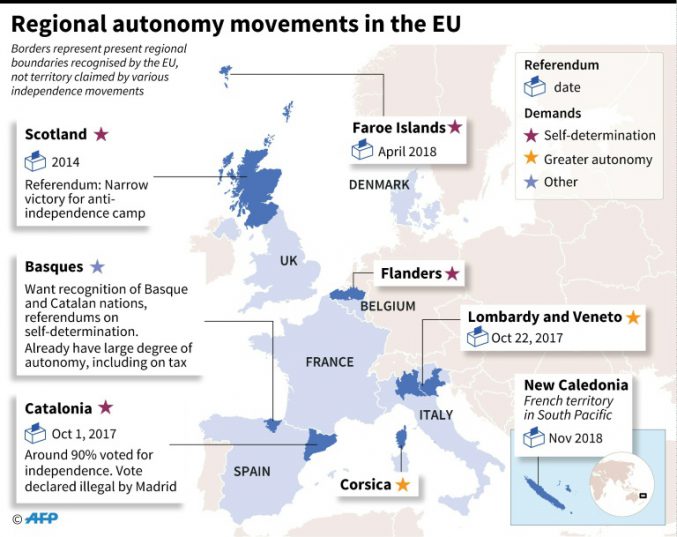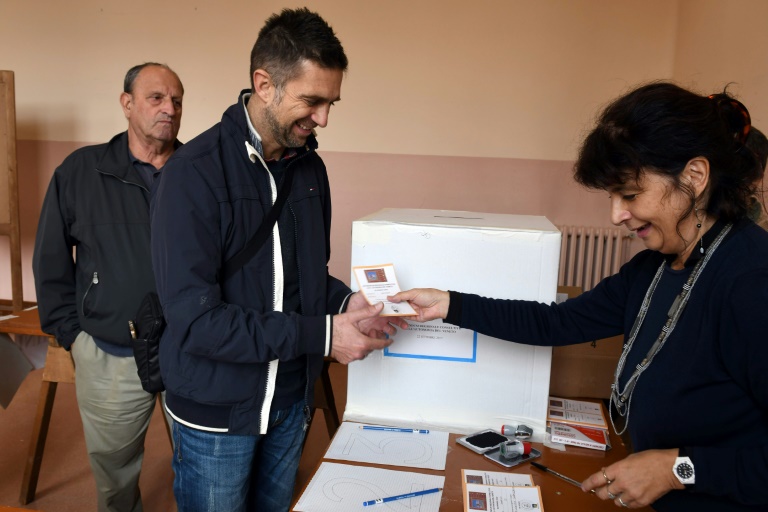Two of Italy's wealthiest northern regions on Sunday voted overwhelmingly in favour of greater autonomy in the latest example of the powerful centrifugal forces reshaping European politics.
Voters in the Veneto region that includes Venice and Lombardy, home to Milan, turned out at the high end of expectations to support the principle of more powers being devolved from Rome in votes that took place against the backdrop of the crisis created by Catalonia’s push for independence.
Veneto President Luca Zaia hailed the results, which were delayed slightly by a hacker attack, as an institutional “big bang”. But he reiterated that the region’s aspirations were not comparable to the secessionist agenda that has provoked a constitutional crisis in Spain.
Turnout was projected at around 58 percent in Veneto, where support for autonomy is stronger, and just over 40 percent in Lombardy. The presidents of both regions said more than 95 percent of voters who had cast ballots had, as expected, done so to support greater autonomy.
The votes are not binding but they will give the right-wing leaders of the two regions a strong political mandate when they embark on negotiations with the central government on the devolution of powers and tax revenues from Rome.
– ‘Our own back yard’ –
Secessionist sentiment in Veneto and Lombardy is restricted to fringe groups but analysts see the autonomy drive as reflecting the same cocktail of issues and pressures that resulted in Scotland’s narrowly-defeated independence vote, Britain’s decision to leave the EU and the Catalan crisis.

Regional autonomy movements in the EU
“What this vote has shown is that there is no ‘autonomy party’ in Veneto — what there is is an entire people who back this idea,” said Zaia.
“What’s won is the idea that we should be in charge of our own back yard.”
Lombardy governor Roberto Maroni said he would be looking to present detailed proposals on devolution within two weeks, in a bid to ensure they are considered before national elections due by May next year.
“I will go to Rome and ask for more powers and resources within a framework of national unity,” he said.
Analysts say the northern regions’ enthusiasm for autonomy does not represent a threat to the unity of Italy in the short term.
But they do see it being a disruptive force over coming decades, particularly as the heavily indebted central government can ill afford to forego the net contribution it gets from the country’s most dynamic areas.
– Pandora’s box –
“Although not threatening the unity of the State, this process risks opening a Pandora’s box and setting in motion widespread centrifugal forces within Italy,” said economist Lorenzo Codogno.

The presidents of Veneto and Lombardy said more than 95 percent of voters who had cast ballots had, as expected, done so to support greater autonomy
A former senior official in the finance ministry, Codogno expects Sunday’s referendums to feed into an ongoing discussion on constitutional reform with the likely outcome a much more federalised country on the model of Germany, rather than disintegration.
Lombardy and Veneto are home to around a quarter of Italy’s population and account for 30 percent of its economic output.
With lower unemployment and welfare costs than the Italian average, both regions are large contributors to Italian government coffers.
Lombardy sends 54 billion euros ($63 billion) more in taxes to Rome than it gets back in public spending. Veneto’s net contribution is 15.5 billion euros.
The two regions would like to roughly halve those contributions by repatriating powers in up to 23 different areas.
The two regional presidents, both members of the far-right Northern League, notably plan to ask for more say over infrastructure, the environment, health and education.
They also want new powers relating to security issues and immigration — steps which would require changes to the constitution.






